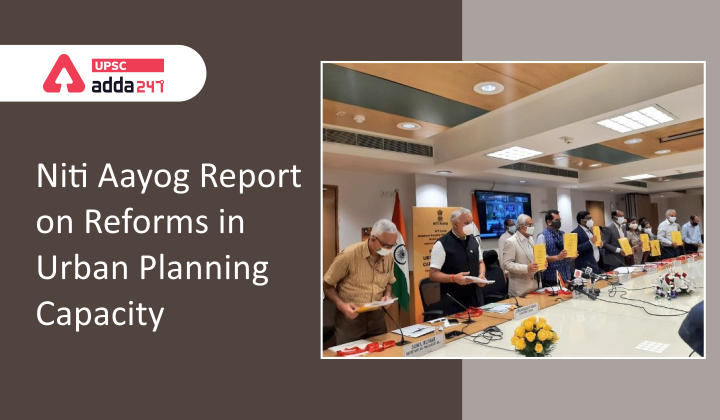Table of Contents
Relevance
- GS 2: Government policies and interventions for development in various sectors and issues arising out of their design and implementation.
Context
- NITI Aayog has recently launched a report on Reforms in Urban Planning Capacity in India toramp up urban planning capacity in India.
Tamil Nadu Wage Urban Employment Guarantee Scheme for Urban Poor
Reforms in Urban Planning Capacity: Why needed?
- India is home to 11% of the total global urban population. By 2027, India will surpass China as the most populous country in the world.
- Unplanned urbanization, however, exerts great strain on our cities.
- In fact, the Covid-19 pandemic has revealed the dire need for the planning and management of our cities.
- Urban planning is the foundation for an integrated development of cities, citizens, and the environment.
- Unfortunately, it has not received due attention so far. The existing urban planning and governance framework is complex, which often leads to ambiguity and lack of accountability.
Key recommendations
- Programmatic Intervention for Planning of Healthy Cities
- Every city must aspire to become a ‘Healthy City for All’ by 2030.
- The report recommends a Central Sector Scheme ‘500 Healthy Cities Programme’, for a period of 5 years, wherein priority cities and towns would be selected jointly by the states and local bodies.
- Programmatic Intervention for Optimum Utilization of Urban Land
- All the cities and towns under the proposed ‘Healthy Cities Programme’ should strengthen development control regulations based on scientific evidence to maximize the efficiency of urban land.
- The report recommends a sub-scheme ‘Preparation/Revision of Development Control Regulations’ for this purpose.
- Ramping Up of Human Resources
To combat the shortage of urban planners in the public sector, the report recommends that the states/UTs may need to
-
- Expedite the filling up of vacant positions of town planners, and
- Additionally, sanction 8268 town planners’ posts as lateral entry positions for a minimum period of 3 years and a maximum of 5 years to meet the gaps.
- Ensuring Qualified Professionals for Undertaking Urban Planning
- State town and country planning departments face an acute shortage of town planners.
- States may need to undertake requisite amendments in their recruitment rules to ensure the entry of qualified candidates into town-planning positions.
- Re-engineering of Urban Governance
- There is a need to bring in more institutional clarity and also multi-disciplinary expertise to solve urban challenges.
- The report recommends the constitution of a high-powered committee to re-engineer the present urban-planning governance structure.
- Revision of Town and Country Planning Acts
- Most States have enacted the Town and Country Planning Acts, that enable them to prepare and notify master plans for implementation. However, many need to be reviewed and upgraded.
- Therefore, the formation of an apex committee at the state level is recommended to undertake a regular review of planning legislations.
- Demystifying Planning and Involving Citizens
- While it is important to maintain the master plans’ technical rigour, it is equally important to demystify them for enabling citizens’ participation at relevant stages.
- Therefore, the committee strongly recommends a ‘Citizen Outreach Campaign’ for demystifying urban planning.
- Steps for Enhancing the Role of Private Sector
- The report recommends that concerted measures must be taken at multiple levels to strengthen the role of the private sector to improve the overall planning capacity in the country.
- Steps for Strengthening Urban Planning Education System
- The Central universities and technical institutions in all the other States/UTs are encouraged to offer postgraduate degree programmes (MTech Planning) to cater to the requirement of planners in the country in a phased manner.
- Measures for Strengthening Human Resource and Match Demand–Supply
- The report recommends the constitution of a ‘National Council of Town and Country Planners’ as a statutory body of the Government of India.
- Also, a ‘National Digital Platform of Town and Country Planners’ is suggested to be created within the National Urban Innovation Stack of MoHUA (Ministry of Housing and Urban Affairs).
- This portal will enable self-registration of all planners and evolve as a marketplace for potential employers and urban planners.




 TSPSC Group 1 Question Paper 2024, Downl...
TSPSC Group 1 Question Paper 2024, Downl...
 TSPSC Group 1 Answer key 2024 Out, Downl...
TSPSC Group 1 Answer key 2024 Out, Downl...
 UPSC Prelims 2024 Question Paper, Downlo...
UPSC Prelims 2024 Question Paper, Downlo...
